AUCD - Leading Change Session: Disability Rights, Ethics and Genetics
<< Back to Program| Download |
|
|
Generating Conversation for Policy and Practice
Tuesday, November 19, 2019 8:30 AM - 10:15 AM
Location: Grand South
Session Description
About this Session
This session is designed to create a foundation for AUCD network-wide dialogue about the impact of scientific advances in the arena of genetics and genomics on the policies, public education, and clinical interventions affecting people with disabilities and their families, with a particular focus on justice issues and historically stigmatized populations.
Participant Outcomes
Participants will be able to:
- Appreciate the conversations that are currently happening on these topics in the scientific, advocacy, public health, academic, policy and practice settings,
- Discuss gaps in these conversations and opportunities to make systems-level improvements, and
- Identify where their voice and perspective would be most valuable to advancing the discussion at the local, state or national level.
Featured Presenter(s)
Facilitator
Angela Martin, LMSW, Associate UCEDD Director, Michigan Developmental Disabilities Institute, Wayne State University
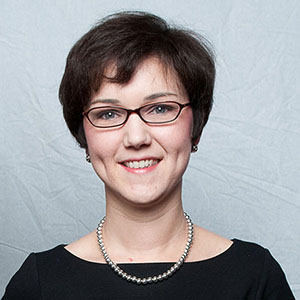
Angela Martin, LMSW is the Associate Director for Community Supports & Services at the Michigan Developmental Disabilities Institute (Michigan's UCEDD & LEND) at Wayne State University in Detroit, Michigan. She has a Master's degree in Social Work from Wayne State University. Angela has experience in resource development, curriculum design, and training programs on Self-Determination, Person Centered Planning, Family Supports and Leadership/Self-Advocacy. Angela currently serves as Family Member Co-Chair of the AUCD Council on Leadership and Advocacy (COLA).
Panelists
Leila Jamal ScM, PhD, National Institute of Allergy and Infectious Diseases
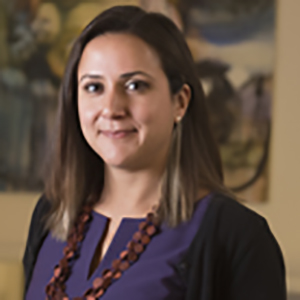 Leila Jamal ScM, PhD is a certified genetic counselor at the National Institute of Allergy and Infectious Diseases (NIAID). At NIAID, she is co-investigator on the Centralized Sequencing Initiative (CSI), a program that uses genomic sequencing to better understand the human immune system. The CSI has developed the first scalable pipeline for returning clinical-grade research results to NIAID research participants. Dr. Jamal's research interests include: How to apply ethical principles to genetic counseling practice both conceptually and pragmatically; how familial and individual interests in genetic information should be conceptualized and balanced; how ethical guidelines about genomics should be implemented in settings with different kinds of resource constraints, and how patients' experiences and values should (or should not be) incorporated into health and science policy. Dr. Jamal holds a master's degree in genetic counseling from the Johns Hopkins School of Public Health and National Human Genome Research Institute (NHGRI). She also holds a PhD in health policy and management (bioethics concentration) from the Johns Hopkins School of Public Health. She currently serves on the Social Issues Committee of the American Society of Human Genetics (ASHG) and is Chair of the Public Policy Committee for the National Society of Genetic Counselors (NSGC).
Leila Jamal ScM, PhD is a certified genetic counselor at the National Institute of Allergy and Infectious Diseases (NIAID). At NIAID, she is co-investigator on the Centralized Sequencing Initiative (CSI), a program that uses genomic sequencing to better understand the human immune system. The CSI has developed the first scalable pipeline for returning clinical-grade research results to NIAID research participants. Dr. Jamal's research interests include: How to apply ethical principles to genetic counseling practice both conceptually and pragmatically; how familial and individual interests in genetic information should be conceptualized and balanced; how ethical guidelines about genomics should be implemented in settings with different kinds of resource constraints, and how patients' experiences and values should (or should not be) incorporated into health and science policy. Dr. Jamal holds a master's degree in genetic counseling from the Johns Hopkins School of Public Health and National Human Genome Research Institute (NHGRI). She also holds a PhD in health policy and management (bioethics concentration) from the Johns Hopkins School of Public Health. She currently serves on the Social Issues Committee of the American Society of Human Genetics (ASHG) and is Chair of the Public Policy Committee for the National Society of Genetic Counselors (NSGC).
Stephanie Meredith, MA
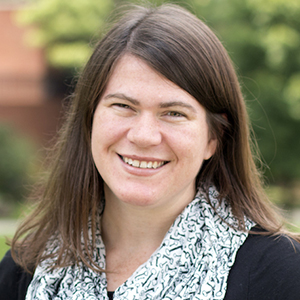 Stephanie Meredith, MA is the author and co-author of multiple resources for new and expectant parents receiving a diagnosis of Down syndrome and other genetic conditions, which are recommended by the American College of Medical Genetics and Genomics (ACMG), the American College of Obstetricians and Gynecologists (ACOG), national disability organizations, and the National Society of Genetic Counselors (NSGC). She worked alongside collaborators at NSGC to create their prenatal screening fact sheet for patients and their Down syndrome fact sheet for states passing Down Syndrome Information Acts. As the Medical Outreach Director of the University of Kentucky's Human Development Institute, Ms. Meredith regularly makes presentations and speaks about patient education and support at national medical and disability conferences. Moreover, she has also published on these issues including a recent publication with Dr. Robert Saul in Pediatrics in Review and Exceptional Parent Magazine on Prenatal Testing: Understanding What's New and How to Get Support and Information. Ms. Meredith also provides online support and resources to pregnant women expecting a baby with Down syndrome at DownSyndromePregnancy.org, and she offers medical outreach training to about 85 local Down syndrome organizations nationwide and consults internationally on best practice strategies for developing and sharing information about genetic conditions for patients.
Stephanie Meredith, MA is the author and co-author of multiple resources for new and expectant parents receiving a diagnosis of Down syndrome and other genetic conditions, which are recommended by the American College of Medical Genetics and Genomics (ACMG), the American College of Obstetricians and Gynecologists (ACOG), national disability organizations, and the National Society of Genetic Counselors (NSGC). She worked alongside collaborators at NSGC to create their prenatal screening fact sheet for patients and their Down syndrome fact sheet for states passing Down Syndrome Information Acts. As the Medical Outreach Director of the University of Kentucky's Human Development Institute, Ms. Meredith regularly makes presentations and speaks about patient education and support at national medical and disability conferences. Moreover, she has also published on these issues including a recent publication with Dr. Robert Saul in Pediatrics in Review and Exceptional Parent Magazine on Prenatal Testing: Understanding What's New and How to Get Support and Information. Ms. Meredith also provides online support and resources to pregnant women expecting a baby with Down syndrome at DownSyndromePregnancy.org, and she offers medical outreach training to about 85 local Down syndrome organizations nationwide and consults internationally on best practice strategies for developing and sharing information about genetic conditions for patients.
Kara Ayers, PhD, Associate Director, University of Cincinnati Center for Excellence in Developmental Disabilities
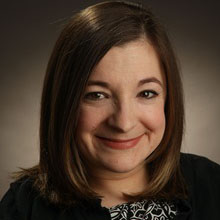 Kara Ayers, PhD, is the Associate Director and an Assistant Professor at the University of Cincinnati Center for Excellence in Developmental Disabilities (UCCEDD). She is Director of the newly formed Center for Dignity in Healthcare for People with Disabilities and also co-founder of the Disabled Parenting Project and. Dr. Ayers' interests include disability identity/culture, bioethics, community inclusion, and the use of media to teach, empower, and reduce stigma. She serves on multiple task forces and national and state coalitions related to improving outcomes for people with disabilities and infuses the mantra, "Nothing about us without us," into all of her scholarly and community-based pursuits.
Kara Ayers, PhD, is the Associate Director and an Assistant Professor at the University of Cincinnati Center for Excellence in Developmental Disabilities (UCCEDD). She is Director of the newly formed Center for Dignity in Healthcare for People with Disabilities and also co-founder of the Disabled Parenting Project and. Dr. Ayers' interests include disability identity/culture, bioethics, community inclusion, and the use of media to teach, empower, and reduce stigma. She serves on multiple task forces and national and state coalitions related to improving outcomes for people with disabilities and infuses the mantra, "Nothing about us without us," into all of her scholarly and community-based pursuits.
Sunday Francis, PhD, University of Minnesota
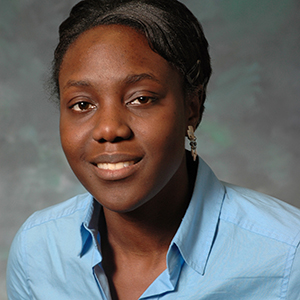 Sunday Francis is a postdoctoral associate at the University of Minnesota (UMN) in the joint lab of Drs. Suma Jacob and Christine Conelea. She earned her doctoral degree in Computational Neuroscience from the University of Chicago exploring neuroplasticity, specifically the effects of motor learning on motor cortex. This non-clinical research had theoretical application towards neuroprosthetics. Francis joined Dr. Jacob's lab at University of Illinois - Chicago and began her postdoctoral career studying ASD. Her early postdoctoral research examined the genetic and molecular role of neurohormones in ASD. After moving to UMN with Dr. Jacob, she completed the Minnesota LEND fellowship, a program that enabled her to go beyond the research setting and connect her scientific knowledge to the local community engaging in research from the level of participant to investigator. She has expanded her research to include ADHD, OCD, and in collaboration with Dr. Bernadette Gillick in the Department of Rehabilitation Medicine, cerebral palsy. Francis is published in the fields of genetics, imaging, and biomarkers and currently is establishing herself within the field of neuromodulation. She also participates in industry-sponsored clinical trials and the nationwide genetic study, Simons Foundation Powering Autism Research for Knowledge (SPARK), identifying genetic variants associated with ASD.
Sunday Francis is a postdoctoral associate at the University of Minnesota (UMN) in the joint lab of Drs. Suma Jacob and Christine Conelea. She earned her doctoral degree in Computational Neuroscience from the University of Chicago exploring neuroplasticity, specifically the effects of motor learning on motor cortex. This non-clinical research had theoretical application towards neuroprosthetics. Francis joined Dr. Jacob's lab at University of Illinois - Chicago and began her postdoctoral career studying ASD. Her early postdoctoral research examined the genetic and molecular role of neurohormones in ASD. After moving to UMN with Dr. Jacob, she completed the Minnesota LEND fellowship, a program that enabled her to go beyond the research setting and connect her scientific knowledge to the local community engaging in research from the level of participant to investigator. She has expanded her research to include ADHD, OCD, and in collaboration with Dr. Bernadette Gillick in the Department of Rehabilitation Medicine, cerebral palsy. Francis is published in the fields of genetics, imaging, and biomarkers and currently is establishing herself within the field of neuromodulation. She also participates in industry-sponsored clinical trials and the nationwide genetic study, Simons Foundation Powering Autism Research for Knowledge (SPARK), identifying genetic variants associated with ASD.
